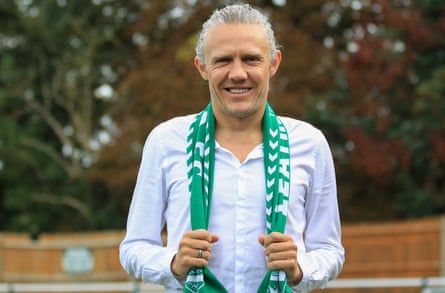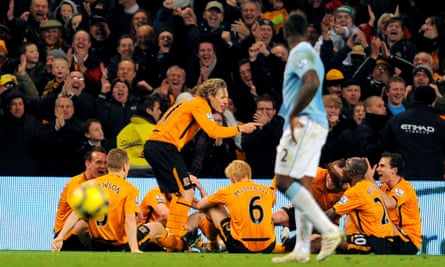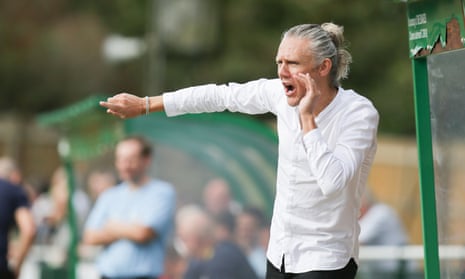Leatherhead is not exactly one of the hotbeds of football in the United Kingdom. In this sleepy town tucked between Dorking and Epsom on the banks of the River Mole, the annual sporting highlight comes when the London-Surrey cycle classic wends its way through the town centre. A little way out of town is the football club at Fetcham Grove, nestling next to the leisure centre. Founded in 1907, the club has hovered around the lower levels of the non-league pyramid, switching between the Surrey Senior League and the Isthmian League for most of its 110-year history.
The Tanners have known better days and were once put firmly on the map by the escapades of Chris Kelly, the “Leatherhead Lip” who spearheaded the club’s famous FA Cup run in the 1974-75 season. Not only did they beat league opposition in Colchester and Brighton, but they were also 2-0 up against Leicester, then of the First Division, before bowing out to great acclaim with a narrow 3-2 defeat at Filbert Street. Kelly’s arrogance and habit of making bold predictions upset his opponents but the media lapped it up enthusiastically.
The suburban town stirred again this season, when another big character pitched up at Leatherhead. Jimmy Bullard took over as manager last September when the club were in danger of being relegated from the Ryman Premier Division, the seventh tier of the English football pyramid. It was an interesting and relatively risky move for the former Wigan, Hull and Fulham player, who was carving out a reasonable career in the media with regular appearances on football shows and even a stint on I’m A Celebrity Get Me Out of Here.

Bullard has never shied away from publicity and Leatherhead attracted a fair sprinkling of attention this season, especially after their 3-2 victory over a Billericay Town team that included former Premier League players Paul Konchesky and Jamie O’Hara. The victory ensured Leatherhead’s survival but more fuss was made of the celebrations in the home dressing room. Led by Bullard, the players blasted out their own version of R Kelly’s The World’s Greatest to mock their opponents’ previous rendition of the song. On a darker note, O’Hara was fined two weeks wages and warned about his conduct after pushing a Leatherhead fan.
On days like this, Bullard’s career looked in danger of being overtaken by his celebrity but he insists he moved to Leatherhead to make a genuine first step on the management ladder. “In my head I always wanted to be a manager,” says Bullard. “But the way I finished because of injury I fell out of love with football really. I watched a bit and tried a bit of commentary, but it just wasn’t for me. So after three or four years of doing different things I knew I wanted to manage, but doing all the television stuff didn’t allow me to do my badges.”
The closest Bullard had come to managing before was when he impersonated Phil Brown’s half-time public dressing-down of Hull players on the pitch at the Etihad. “I had spoken to a couple of my former bosses, such as Tony Burman, who was in charge at my first semi-pro club, Dartford, and Karl Robinson [who was his manager at MK Dons when Bullard was forced to retire] and said: ‘Can I come and ghost you.’ So I was picking up some experience. They were absolutely brilliant for me.”

Leatherhead chairman Richard Brady approached Bullard for an initial chat, but was so bowled over by Bullard’s infectious enthusiasm that he offered him the job on the spot. Bullard accepted with similar alacrity and, although there was an element of risk taken by both sides, their partnership has worked out rather well. At the time of his appointment Brady said: “Jimmy has gained a wealth of experience into a variety of management and coaching techniques as a player and [has] a very clear philosophy in terms of how he wishes the team to play.”
That philosophy is very much in the modern European mould of keeping possession and looking after the ball. “Go and watch Barcelona or Ajax play,” says Bullard. “They hold on to the ball, pass it sideways or backwards more than going forwards. When I first arrived at Leatherhead, I banned our keeper from kicking it long. For the first six games I told him ‘if you ever knock it long, I’ll be on your case’ and I insisted that he played it short. In warming up, I had him join in the rondos with the outfield players so he was comfortable with the ball at his feet. If I have a keeper who can play like a central midfielder, then I have 11 players rather than 10. I’ve got a deep sweeper.”
The stark contrast between the Premier League, where Bullard made most of his appearances, and the lower rungs of the football ladder was best illustrated when Leatherhead were deducted three points for fielding an ineligible player in a match against Hendon in December just a few months into his spell in charge. Welcome to the real world, Jimmy. It also took him some time to acclimatise to the players’ fitness – or lack thereof – which is hardly surprising considering they are part-timers.
Beneath his cheeky-chappy persona, Bullard was a player who thought about the game. “I was always intrigued by management and I wish I could turn the clock back and pick the brains of each of my managers,” he says. “I was one of the few players who did challenge the manager now and again if I thought they were wrong but didn’t take it any further.” He fell out with Roy Hodgson while they were at Fulham together but he insists Hodgson “was by far and away the best tactical manager I ever played for – but his man-to-man management skills with me and a few others were terrible. He was just not a good man-manager and that is what led to our disagreement.”
Bullard is now developing his own man-management skills. “As a player you can be very selfish,” he says. “You can be in your own bubble and, as long as you produce, everyone’s happy. Whereas being a manager you have to be constantly thinking about others, a whole group of people, up to 20 of them including players, coaches, assistants, etc. Some needed a kick up the arse while others needed an arm around their shoulder. I remember having to give an absolute rollicking to Gerry, our centre-back, who is such a lovely guy, rather than having a pint with him in the bar. It was tough but it worked and, partly as a result of that, he was clearly our best player in the last eight or so matches.”
Bullard improved individual players as he steered Leatherhead away from relegation but, ultimately, he was frustrated by the lack of time he had to develop the side. His team only trained once a week, on Thursday nights, and he felt unable to fully impart his philosophy, so decided to move on at the end of the season. There are no hard feelings but he is keen to gain the necessary qualifications to manage at a higher level and is setting his sights on a position at the fifth or sixth tier of English football.
“I loved every minute of managing Leatherhead. From when I met Richard, to taking the very first training session, to the first match onwards, it was such a great experience. I want to go as close to full-time as possible as I need the time with the players. I want to manage at Conference or Conference South level, but I won’t be an assistant as my beliefs are so strong, I need to be in charge.”
Bullard is planning to take the fast-track route offered by the Irish FA, which allows former players to spend an intensive few weeks getting their badges up to Uefa B qualification. And, when he returns to management, he knows what he will be asking from his team: “I want my players to work their nuts off when they’re out of possession and when we’ve got the ball I want them to rest with the ball.”

Comments (…)
Sign in or create your Guardian account to join the discussion